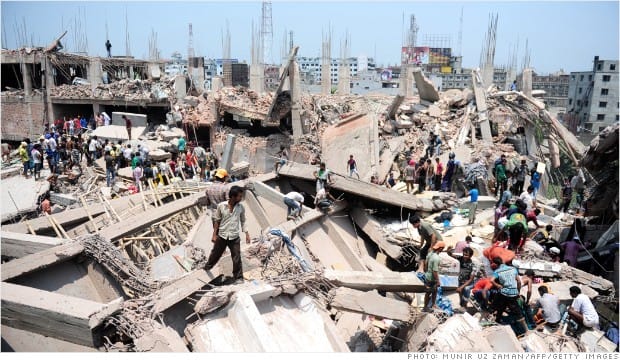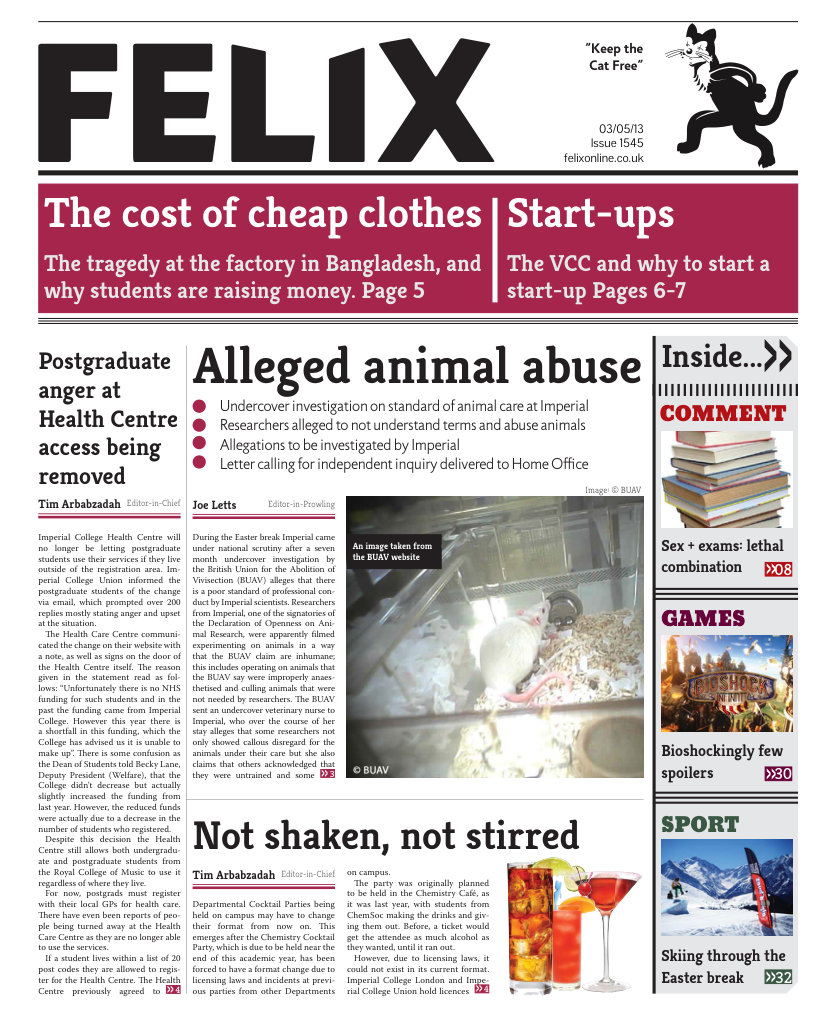The real cost of our cheap clothing
The RCSU are raising funds for the victims of the accident in Bangladesh. This is the price of our budget clothes

As a new term dawns we know we won’t be the only ones indulging in a little online shopping procrastination. We are often reminded to think about where the various elements of our life come from, our food, our energy, but what about our clothes? At a time when your moral and ethical values are seriously questioned if you are seen buying anything other than free range, organic super eggs we very rarely question shopping at chains like Primark of H&M. Well, who can blame us when we can buy all our shoes for under a tenner, right? Maybe not.
Due to all of us being such diligent students who barely have time to leave the library let alone pick up a newspaper, many may not be aware of a disaster that took place over the course of last week. On Wednesday 24th April, a building containing three garment factories collapsed near the centre of the Dhaka the capital city of Bangladesh. The building, which has been undergoing renovation, had been told to close after large cracks appeared the day before the disaster. Despite this, the garment factories opened as normal with employees being told they would lose their jobs unless they arrived at work as usual. Due to this, some 377 people, of the 3000 people inside the building at the time of the collapse, are known to have died and hundreds are still missing.
As shocking and awful as this tragedy is, the more shocking thing to learn is that this is just another event in a series of catastrophes that mar the Bangladeshi textile industry. Just 6 months ago another factory caught fire killing 123 people and leaving another 150 injured.
The growth of the textile industry has sometimes been compared to the Industrial revolution and it is true that it has provided jobs, especially for Bangladeshi women, but at what cost?
An online Bangladeshi news source bdnews24.com published an article last week titled “Despite disasters, Bangladesh works for retailers”. It details that despite industrial disasters in the garment industry, there were few signs that safety issues and other questionable labour conditions are having any effect on major Western retailers, their shareholders and the consumers. Ready-made garments make up 80% of Bangladesh’s total exports, which makes it harder for the country to take a stand against Western exploits.
About 18 months before the previous big tragedy in Bangladesh - a fire in November in a textile factory that killed 112 people - shareholders at Wal-Mart Stores Inc had the opportunity to weigh in on the safety question. By a nearly 50-to-1 margin, they rejected a proposal to require suppliers to report annually on safety issues at their factories. In arguing against the proposal, Wal-Mart's management made its reasoning clear: Having suppliers compile such reports "could ultimately lead to higher costs for Walmart and higher prices for our customers. This would not be in the best interests of Walmart's shareholders and customers and would place Walmart at a competitive disadvantage," the company said in proxy materials. (Source: bdnews24.com)
This sends a clear message from these companies. End of the day, it’s a simply calculation that has hardly been swayed by industrial disasters. Cheaper products appeal to shoppers and the taints from these incidents are manageable through PR stunts. Take Primark for example. After it was revealed that Rana Plaza contained one of its suppliers, the company was quick to take a PR stand and “review its commitments constantly to ensure they met the needs of the victims as the tragedy continues to unfold”. Their move to pay compensation to some of the victims only came after several protests outside its store on Oxford Street.
The share prices for these companies stay perfectly intact as news of these kinds of disasters fade away from people’s minds. The world’s court system stands idly on the sidelines as well. In 2005, a lawsuit filed in California state court on behalf of factory workers in Bangladesh, China, Indonesia and other countries accusing Wal-Mart of failing to address substandard working conditions in suppliers’ factories. The case was ultimately dismissed and no US lawsuits have been filed against Wal-Mart since then on similar matters.
There have been pressures from activists regarding working conditions in garment factories but it has simply been a case of the little person trying to stand up to big companies. Companies often resist efforts to force a deeper discussion about the tradeoffs between worker safety and product costs.
Before Wal-Mart invited shareholders to this year's annual meeting, to take place June 7, the board of directors rebuffed another effort to force a shareholder vote on workplace safety issues. According to documents filed with the US Securities and Exchange Commission, a shareholder presented a proposal to require the company to report on its progress for assessing risks to human rights in its operations and supply chain. But Wal-Mart said the proposal was so similar to the one that failed in 2011, and that it already addresses the request through its standards for suppliers, that it did not merit reconsideration. The SEC approved its decision to reject the request for a shareholder vote.
A common thought to most people buying the clothes produced in these factories is what can I do? Being students it may be difficult to always consider where and how our clothes are being produced. It is even harder, towards the end of a long term when the student loan has run out and the laundry pile is building up. One can’t surely be blamed for running to Primark to stock up on essentials like socks. It is not always feasible to avoid the high street bargains. But until it is, you could donate at least something to RCSU RAG’s fund for the victims of the Bangladesh textile factory collapse, even if it’s just the cost of a Primark t-shirt. All the money raised is going towards Save the Children’s Emergency fund and will be used to support children who were either injured in the collapse or who lost their parents. This will allow some help to the victims and raise awareness of the conditions that most of our clothes are produced in.
We know it is not possible to always shop ethically produced clothing, but hopefully being a little more informed will help you know when you can.
It only takes 2 minutes to donate. Donate at www.rcsu.org.uk/donate







